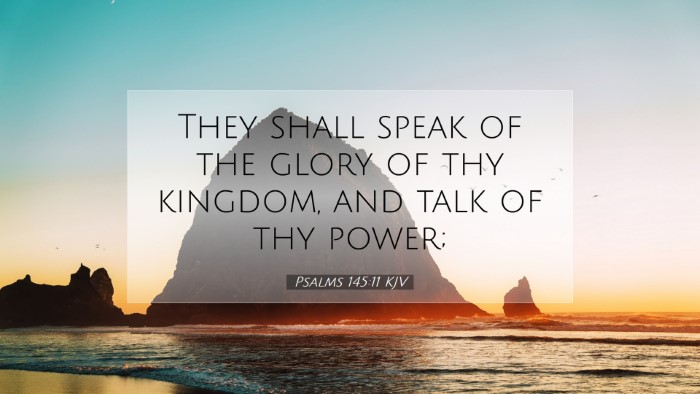Psalms 145:11 - Commentary and Insights
Psalms 145:11 states:
"They shall speak of the glory of thy kingdom, and talk of thy power."
This verse is part of a larger Psalm attributed to David, which exalts the greatness, majesty, and eternal rule of God. This commentary aims to delve deeper into the implications and theological dimensions of this verse, drawing insights from eminent public domain theologians including Matthew Henry, Albert Barnes, and Adam Clarke.
Contextual Background
The book of Psalms contains a diverse collection of hymns, prayers, and expressions of worship. Psalm 145 is an acrostic poem, celebrating God’s greatness and His eternal kingdom. David, who is anointed as a king and a man after God's own heart, recounts his personal devotion and the communal response of praising God's sovereignty.
Verse Analysis
The essence of Psalms 145:11 lies in its two primary components: the glory of God’s kingdom and the demonstration of His power. Each aspect is worthy of close examination.
The Glory of Thy Kingdom
Henry notes that the kingdom of God reflects His sovereignty over creation, His providential care, and His redemptive purposes. The word "glory" refers not only to the visible splendor of God’s reign but also to the moral excellency and majesty inherent in His rule.
Barnes emphasizes that acknowledging the glory of God's kingdom is essential for the faithful. It is a proclamation of God's authority and majesty that transcends all earthly kingdoms.
Talk of Thy Power
In discussing God's power, Clarke highlights the manifestations of divine strength throughout Scripture: creation, providence, and redemption. God's omnipotence is not just an abstract attribute but is evidenced in His actions—sustaining the universe, delivering His people, and transforming lives.
Henry adds that the faithful are called to speak of God’s power in a public manner. This not only serves to build up the church but also to evangelize those outside the faith. This testimony of God’s power inspires confidence and reverence among believers.
Theological Implications
Understanding the significance of this verse bears profound theological implications:
- God’s Sovereignty: The verse affirms God’s rule and dominion over all. He is sovereign across all realms of existence, and this sovereignty invites a response of worship from His followers.
- The Role of Humanity: The verse highlights the role of God’s people in proclaiming His glory and power. Every believer is both a recipient of God’s grace and a witness to His majesty.
- The Nature of Worship: Worship involves acknowledging who God is and what He has done. This verse illustrates that part of worship is not merely silent reflection but an active response in both community and personal contexts.
Practical Application
For pastors, students, and scholars, the insights from Psalms 145:11 can serve as a guiding framework for both personal spirituality and community worship. Reflecting on the kingdom of God and His power can lead to:
- Encouragement in Ministry: Knowing the glory of God's kingdom provides strength and motivation for pastors in their ministries, reminding them of the divine backing they have.
- Community Engagement: This verse serves as a reminder to congregations to share their testimonies and experiences of God's power in their lives, fostering a vibrant community of faith.
- Academic Pursuits: Theological students can explore doctrines of God's sovereignty and power as they prepare for future ministry, enriching their understanding of God’s nature and mission.
Conclusion
Psalms 145:11 presents a compelling call to recognize and proclaim the glory of God's kingdom and His unmatched power. By reflecting on the insights provided by renowned commentators, we gain not only a deeper understanding of the text but also practical applications that resonate with our faith today. This verse encapsulates a central theme of the Christian faith: the active glorification of God and a commitment to proclaim His mighty works.


